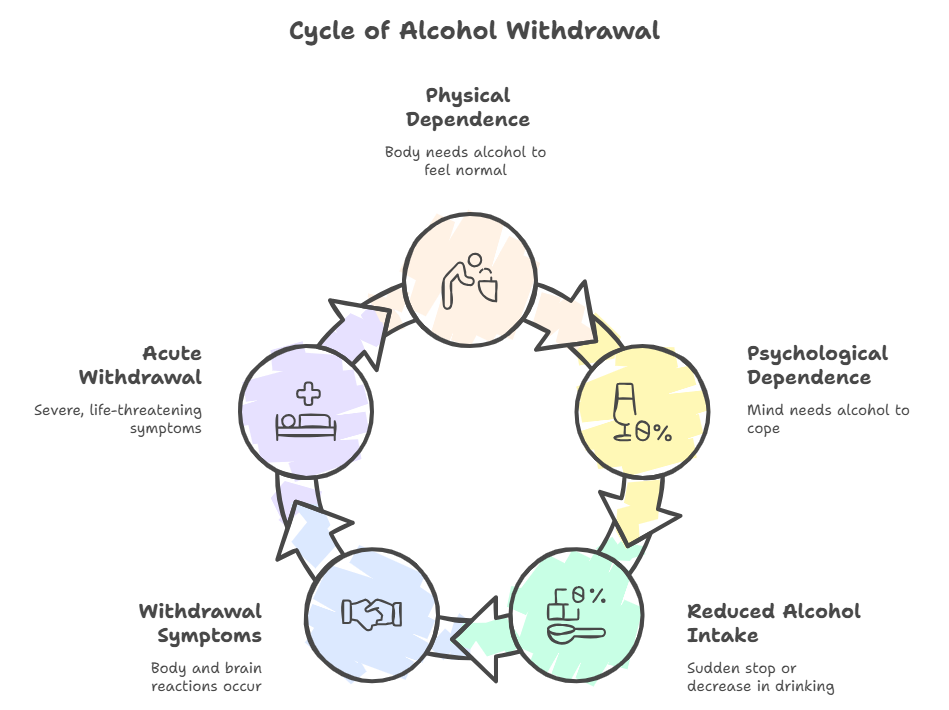Alcohol withdrawal is a set of body reactions that happens when someone with alcohol dependence or alcohol use disorder (AUD) stops drinking alcohol or drinks much less. The doctors and the DSM-5 call this alcohol withdrawal syndrome (AWS).
The causes of alcohol withdrawal are brain chemical changes and body tolerance. Alcohol affects gamma-aminobutyric acid (GABA) (the brain’s calming chemical) and glutamate (the brain’s exciting chemical). When drinking stops, the central nervous system (CNS) becomes overactive, causing withdrawal symptoms.
The symptoms of alcohol withdrawal include shaking, sweating, nausea, headaches, anxiety, sleep problems, depression, hallucinations, seizures, and delirium tremens (DTs). According to American Addiction Centers, delirium tremens occurs in about 3–5% of withdrawal cases, with up to 37% of untreated cases resulting in death.
The timeline of alcohol withdrawal starts 6 to 12 hours after the last drink and could worsen for 24 to 72 hours, then slowly improve over 3 to 14 days.
The diagnosis of alcohol withdrawal involves alcohol detox, which includes medical checks, doctors asking about drinking history questions, and tests such as the CIWA-AR test.
The treatment of alcohol withdrawal includes medical detox, inpatient treatment, outpatient treatment, medications like benzodiazepines, anticonvulsants, antipsychotics, and beta-blockers, and therapy.
The risk factors of untreated alcohol withdrawal include complications like dehydration, arrhythmia, relapse, seizures, heart problems, brain damage, and, in severe cases, death.
The prevention strategies for alcohol withdrawal include cutting down slowly, seeking medical help, staying hydrated, having support groups like AA and counselling, and avoiding triggers.
What Is Alcohol Withdrawal?
Alcohol withdrawal is the body and brain reactions that happen when someone who drinks alcohol a lot for a long time suddenly stops or drinks much less. Doctors call this alcohol withdrawal syndrome (AWS). Doctors use DSM-5 to diagnose it, where at least two withdrawal symptoms appear after drinking is reduced.
Alcohol withdrawal syndrome happens when one has physical dependence, where the body needs alcohol to feel normal, and psychological dependence, where the mind feels in need of alcohol to cope with daily life. In severe cases, one experiences acute withdrawal, where symptoms start fast and become life-threatening.
What is the difference between Alcohol Withdrawal and Alcohol Detox?

The main difference between alcohol withdrawal and alcohol detox is that alcohol withdrawal is the body’s reaction to stopping alcohol. In contrast, detox is the medical process of managing these body reactions safely.
Alcohol withdrawal happens automatically when someone with alcohol dependence stops drinking, causing the central nervous system (CNS) to become overactive.
Alcohol detox is the supervised medical treatment that prevents dangerous alcohol withdrawal symptoms, such as seizures and death.
The following table shows the key differences between alcohol withdrawal and alcohol detox in medical settings and patient care approaches.
|
Alcohol Withdraw |
Alcohol Detox |
|
The body’s reactions when alcohol use stops |
It is a medical process to manage body reactions safely |
|
Happens naturally with alcohol dependence |
Done under a doctor’s supervision and planning |
|
Symptoms include shaking, sweating, anxiety, nausea, and seizures |
Symptoms are controlled with medicine, mainly Benzodiazepines, and constant monitoring |
|
Serious risk if untreated, such as seizures, delirium tremens (DTs), or death |
Prevent seizures, DTs, and other life-threatening problems through medical care |
|
Affects brain chemicals (GABA and glutamate? |
Use medicine such as Anticonvulsants to restore brain chemicals balance |
|
Last 3 days to a week without support |
Managed on a set timeline (e.g, 5 to 7 days) with medical help |
What are the Causes of Alcohol Withdrawal?
The main causes of alcohol withdrawal are brain changes, body tolerance, and brain chemical imbalance.
The main causes of alcohol withdrawal are explained below:
- Brain Changes: The brain changes when it gets used to alcohol and depends on it to feel “normal.” When alcohol is taken away, the brain struggles to work without it, leading to withdrawal symptoms such as sweating, shaking, and seizures.
- Body tolerance: Body tolerance is when the body gets used to alcohol and so needs more and more alcohol to feel the same effects. Tolerance makes the brain change its chemicals to deal with alcohol every day.
- Brain Chemical Balance: A brain chemical imbalance occurs when alcohol strengthens GABA’s calming effect while blocking glutamate’s stimulation. Over time, the brain adjusts by becoming less sensitive to GABA and more sensitive to glutamate. When alcohol use stops, there isn’t enough calm from GABA and too much activity from glutamate. These changes disturb the balance that controls brain calmness and activity. Without enough GABA and excess glutamate, the brain becomes too active, leading to withdrawal symptoms like anxiety, sweating, shaking, and seizures.
What Are the Symptoms of Alcohol Withdrawal?
The symptoms of alcohol withdrawal are hand tremors, sweating, headaches, nausea, muscle aches, fast heartbeat, high blood pressure, vomiting, seizures, high fever, trouble sleeping, depression, feeling worried, mood swings, memory problems, confusion, strong craving, hallucinations, extreme confusion, seizures, delirium tremens.
The symptoms are classified into physical and psychological categories, ranging from mild to moderate and severe.
The symptoms happen when someone with alcohol dependence stops drinking, and the central nervous system (CNS) becomes overactive without alcohol’s calming effect.
The Physical Symptoms of Alcohol Withdrawal
The physical symptoms of alcohol withdrawal are:
- Hand tremors
- Sweating
- Headaches
- Nausea
- Muscle aches
- Fast heartbeat
- High blood pressure
- Vomiting
- Seizures
- High fever
The Psychological Symptoms of Alcohol Withdrawal
The psychological symptoms of alcohol withdrawal are:
- Trouble sleeping
- Depression
- Feeling worried
- Mood swings
- Memory problems
- Confusion
- Strong cravings
- Hallucinations
- Extreme confusion
The physical and psychological symptoms of alcohol withdrawal are divided into mild, moderate, and severe based on how serious they are during alcohol detox.
Mild Alcohol Withdrawal Symptoms
The mild alcohol withdrawal symptoms start 6 to 12 hours after the last drink. The mild symptoms of alcohol withdrawal are;
- Hand tremors
- Sweating
- Headaches
- Nausea
- Trouble sleeping
- Feeling worried/anxious
- Loss of appetite
The mild alcohol withdrawal symptoms are explained below.
- Hand tremors are shaking hands that worsen when holding things or writing.
- Sweating becomes heavy even when the temperature is not high.
- Headaches are painful pressures in the head caused by constricted blood vessels, which feel like tight bands around the head.
- Nausea is a feeling of sickness in the stomach that leads to vomiting.
- Trouble sleeping is a hard time falling asleep or staying asleep.
- Feeling worried is mild anxiety and restless feelings from GABA chemical problems, which become too low in the brain.
Moderate Alcohol Withdrawal Symptoms
Moderate symptoms of alcohol withdrawal happen 12 to 24 hours after stopping alcohol and are more serious than mild symptoms.
The moderate alcohol withdrawal symptoms are:
- Muscle aches
- Mood swings
- Memory problems
- Confusion
- Fast heartbeat
- High blood pressure
- Vomiting
- Strong cravings
The moderate alcohol withdrawal symptoms are explained below.
- Muscle aches are body pains and stiffness from central nervous system (CNS) stress.
- Mood swings are quick changes from sad to angry because brain chemicals are mixed up (GABA and glutamate are not balanced)
- Memory problems are trouble remembering things clearly during alcohol withdrawal.
- Confusion is trouble thinking straight and making decisions.
- A fast heartbeat is the heart beating too quickly due to body stress during alcohol detox.
- High blood pressure is the blood pressure that increases when the body adjusts to no alcohol.
- Vomiting is throwing up more often than just feeling sick to the stomach.
- Strong cravings are very strong urges to drink alcohol to stop bad feelings. Craving feels like the body needs alcohol to live.
Severe Alcohol Withdrawal Symptoms
Severe symptoms of alcohol withdrawal happen 48 to 96 hours after the last drink and causes death without medical help. The severe alcohol withdrawal symptoms are:
- Seizures
- Hallucinations
- High fever
- Extreme confusion
- Dangerous blood pressure
- Delirium tremens
The severe alcohol withdrawal symptoms are explained below.
- Seizures are body fits that happen in 5% of severe alcohol withdrawal cases when glutamate levels get too high. Seizures make the whole body shake hard and cause brain damage if not medically checked.
- Hallucinations are seeing, hearing, or feeling things that are not real during acute withdrawal. One sees bugs crawling on their skin or hears voices.
- A high fever is a body temperature over 101° F (38.3°C), which is harmful to the brain. A high fever causes one to sweat heavily and feel very unwell.
- Extreme confusion is not knowing where you are or what day it is, or your own name, during severe withdrawal.
- Dangerous blood pressure is blood pressure so high that it causes heart attacks or strokes. Dangerous blood pressure from alcohol withdrawal goes over 180/110 in severe cases.
- Delirium tremens is the most dangerous form of alcohol withdrawal that includes seeing scary things, extreme confusion, body shaking, high fever, and fast breathing.
What are the Early Signs of Alcohol Withdrawal?
The early warning signs of alcohol withdrawal are:
- Shaky hands
- Sweating
- Nausea
- Headaches
- Feeling worried/anxious/restless feelings
- Trouble sleeping
- Fast heartbeat
- Mood changes
- Alcohol cravings
- Hard time focusing
What Is Delirium Tremens (DTs)?
Delirium Tremens (DTs) is the most severe form of alcohol withdrawal, affecting approximately 3–5% of withdrawal cases. The symptom occurs between 48 and 96 hours after the last drink and manifests between the third and fifth day of alcohol withdrawal. Delirium tremens lasts 3 to 5 days, but in rare cases, it may last up to 8-10 days.
The signs of delirium include seeing things that are not real, extreme confusion, severe shaking, a high fever over 101 °c, a rapid heartbeat over 120 beats per minute, and heavy sweating. Without treatment, DT leads to seizures, heart failure, and brain damage, with up to 37% of untreated cases resulting in death.
How Long Does Alcohol Withdrawal Last?
Alcohol withdrawal lasts for about 3 days, but Post-Acute Withdrawal Syndrome (PAWS), like sleep problems, anxiety, depression, and poor focus, lasts for weeks or months. The duration depends on how much you drink, how long you have been drinking, and your overall health.
Alcohol withdrawal symptoms peak at 48 to 72 hours after the last drink, when they’re most dangerous.
They start to improve after 3 days, but it takes weeks or months for them to disappear completely. The central nervous system needs time to adjust when alcohol stops, and GABA and glutamate brain chemicals must return to normal balance for alcohol withdrawal symptoms to improve.
Alcohol withdrawal happens in stages, starting with 6 to 12 hours after the last drink, peaking after a few days, and then slowly getting better.
Here’s a timeline of alcohol withdrawal following 5 main stages, showing how symptoms change over time.
- Stage 1: 6 to 12 hours show early alcohol withdrawal symptoms begin, such as mild anxiety, sweating, headaches, nausea, and trouble sleeping.
- Stage 2: Moderate symptoms develop in 12 to 24 hours, including a fast heartbeat, throwing up, and trouble sleeping.
- Stage 3: 24 to 72 hours is the peak danger stage with dangerous alcohol withdrawal symptoms such as seizures, hallucinations, and delirium tremens (DTs).
- Stage 4: 1 week+ of alcohol withdrawal, many symptoms start to slowly get better as brain chemicals start returning to normal balance. Sleep, mood, and energy are still affected.
- Stage 5: Post-Acute Withdrawal Syndrome (PAWS) is a set of withdrawal symptoms that last long after the first week of alcohol withdrawal is over. PAWS happens because the brain is still healing and trying to balance its chemicals after heavy alcohol use. Alcohol withdrawal symptoms, such as trouble sleeping, depression, and trouble concentrating, last for weeks or even months, making recovery harder if not managed.
The table below shows the complete timeline of alcohol withdrawal stages and their symptoms.
|
Stage |
Timeline |
Symptoms |
|
Early/Mild Stage |
6-12 hours after last drink |
Mild anxiety/worry, sweating, headaches, nausea, shaky hands |
|
Moderate Stage |
12-24 hours after last drink |
Shaking, fever, fast heartbeat, throwing up, mood swings, insomnia (trouble sleeping) |
|
Peak Stage |
24-72 hours after last drink |
Seizures, hallucinations, delirium tremens, high fever, extreme confusion |
|
Recovery Stage |
1 week+ after last drink |
Symptoms slowly improve |
|
PAWS Stage |
Weeks to months later |
Mild anxiety, mood changes, sleep problems, memory issues |
How Do Doctors Diagnose Alcohol Withdrawal?
Doctors diagnose alcohol withdrawal through careful medical checks, asking about your drinking habits, and using special tests such as CIWA-Ar scale testing to measure withdrawal symptoms.
Here are the tools and steps doctors use to identify and diagnose alcohol withdrawal.
- Medical history questions
- Physical examination
- CIWA-Ar scale testing
- DSM-5 criteria checking
- Blood tests
- Mental status evaluation
The doctor’s steps and tools for diagnosing alcohol withdrawal are explained below.
- Medical history questions are questions about one’s drinking habits. Doctors ask about how much you drink, how often, and when you had the last drink, and whether you ever had withdrawal before. The alcohol withdrawal question helps doctors know your alcohol dependence or alcohol use disorder (AUD).
- A physical examination is when doctors check your body, measuring your heart rate, blood pressure, and temperature. They’ll look for shaking hands, sweating, or nervousness. These signs show how your central nervous system reacts without alcohol.
- The Clinical Institute Withdrawal Assessment for Alcohol-revised (CIWA-AR) scale testing measures 10 withdrawal symptoms and gives one a number score. Doctors use CIWA-AR scale scores to decide if a person needs medicine or hospital care during alcohol withdrawal.
Here are withdrawal symptoms doctors measure through CIWA-Ar scale testing.
- Tremor
- Anxiety
- Agitation
- Headache
- Nausea/vomiting
- Paroxysmal sweats
- Tactile disturbances
- Visual disturbances
- Auditory disturbances
- Clouding of sensorium
DSM-5 criteria checking is a Diagnostic and Statistical Manual criterion that lists specific rules for diagnosing alcohol withdrawal symptoms. The requirements say one must show at least 2 withdrawal symptoms that begin after reducing or stopping alcohol use.
These symptoms include:
- Shaking or tremors
- Sweating
- Nausea or vomiting
- Anxiety or irritability
- Trouble sleeping
- Hallucinations
- Seizures
These signs also appear in other conditions, such as anxiety, infections, or low blood sugar not caused by drinking alcohol. Because of this, doctors must review a patient’s complete medical history to minimise misdiagnosis risks.
- Blood tests use blood samples to check alcohol levels, liver health, vitamin levels, and electrolyte balance. The doctors use blood tests to see if alcohol withdrawal is causing dangerous changes in the body.
- Mental status evaluation is a simple test of clear thinking. Doctors ask questions like “What day is it?” or “Where are you?” to observe your alertness. Doctors easily find confusion, memory problems, or hallucinations, which happen during severe withdrawal.
What Are the Treatment Options for Alcohol Withdrawal?
The common treatment options for alcohol withdrawal include medical detox, medications, an outpatient treatment program, an inpatient treatment program, therapy, and support groups.
The treatment options for alcohol withdrawal are explained below.
Medical Detox
Medical detox is when doctors and nurses watch your health closely while you stop drinking alcohol. They monitor vital signs, such as heart rate and blood pressure, and administer fluids and medications to stabilise you for a few days.
Medications
Medications are medicines that doctors give to treat and ease alcohol withdrawal symptoms. They calm the brain and prevent seizures. Benzodiazepines like diazepam and lorazepam are the first-choice medications that work best to slow down brain overactivity.
Anticonvulsants such as carbamazepine or valproic acid are useful when Benzodiazepines are insufficient. They steady one’s mood and control the nervous system.
Antipsychotics such as haloperidol are given for symptoms such as hallucinations, agitation, or confusion.
Beta-blockers, such as propranolol, are most effective for treating a rapid heartbeat, trembling hands, or high blood pressure, as they help reduce stress in the body.
Outpatient Treatment Programme
An outpatient treatment programme is a service that allows patients experiencing mild alcohol withdrawal symptoms to remain at home while visiting a doctor for check-ups, counselling, and support.
Inpatient Treatment Program
An inpatient treatment programme involves alcohol withdrawal care where a patient stays in hospital or a rehab centre for several days, with doctors providing 24-hour supervision. The programme is designed for individuals with severe alcohol withdrawal symptoms or a history of seizures.
Therapy
Therapy is a treatment to understand one’s alcohol use disorder (AUD) and teach them how to handle stress, spot triggers, and stay sober. Therapy includes methods such as talk therapy and motivational sessions.
Support Groups
Support groups are meetings where people with alcohol dependence share experiences and encourage each other during recovery. Support groups like Alcoholics Anonymous (AA) connect you to other people who are working to stop drinking, giving encouragement and accountability.
There are no home remedies for alcohol withdrawal because severe symptoms such as seizures or delirium tremens (DTs) are life-threatening without medical supervision.
What Are the Risks of Untreated Alcohol Withdrawal?
The common risks of untreated alcohol withdrawal are listed below:
- Seizures are body fits that happen when the brain gets too active without alcohol.
- Hallucinations are seeing or hearing things that are not real during alcohol withdrawal symptoms.
- Delirium tremens is the most dangerous form of alcohol withdrawal that happens in 3-5% of cases. It includes confusion, high fever, and a fast heartbeat.
- Relapse is going back to drinking alcohol to stop the painful withdrawal symptoms.
- Death rates reach 37% of untreated delirium tremens cases. Heart problems, brain damage, or other complications during severe alcohol withdrawal also cause death.
How to Prevent Alcohol Withdrawal?
To prevent alcohol withdrawal, consider safe steps under supervised management. Stopping suddenly and alone is dangerous. The goal is to reduce drinking in a way that protects the brain and body with proper support.
Here are safe steps to prevent alcohol withdrawal.
- Gradual Tapering: Gradual tapering is cutting down on alcohol slowly to reduce stress on the body.
- Medical Supervision: Medical supervision involves working with doctors to monitor your health and administer medications as needed.
- Family Support: Family support involves loved ones for daily help and encouragement
- Relapse Prevention: Relapse prevention is joining support groups like Alcoholics Anonymous (AA) or therapy to stay sober.
What is the difference between Alcohol Dependence and Alcohol Addiction?
The main difference between alcohol dependence and alcohol addiction is that alcohol dependence focuses on the body’s physical need for alcohol. In contrast, alcohol addiction includes both physical and mental obsession with drinking. Alcohol dependence means the body expects alcohol every day. Alcohol addiction includes alcohol dependence plus the mental inability to control drinking despite knowing it causes health problems.
The signs and symptoms of alcohol dependence syndrome include;
- Needing more alcohol to feel the same effects
- Getting withdrawal symptoms when alcohol stops
- Spending lots of time drinking or thinking about drinking alcohol
- Giving up activities to drink instead
- Continuing to drink despite health problems
What is the difference between Alcohol Withdrawal and Alcohol Poisoning?
The difference between alcohol withdrawal and alcohol poisoning is that alcohol withdrawal occurs when someone stops drinking alcohol after long-term use. Alcohol poisoning happens when someone consumes too much alcohol at once.
Alcohol withdrawal is treated with medical detox and medications to help the brain adjust to functioning without alcohol. Alcohol poisoning requires emergency care to remove alcohol from the body and to support breathing and heart functions until alcohol levels drop to safe levels.





